13 Irish Gods and Goddesses of Ireland
Growing up in Ireland, we are often told stories of ancient Irish Gods and Goddesses who once roamed the land. Irish mythology is a treasure trove of stories passed down through generations, deeply rooted in Ireland’s ancient traditions. The Irish gods and goddesses who once reigned over Ireland’s land and seas are not just figures of legend but integral to our cultural heritage.
They feature in tales that have shaped Irish Culture, influencing everything from art and literature to our values. By exploring these ancient deities, we connect with Ireland’s rich history and the stories that continue to inspire and define our culture today.
In this blog post, we’ll examine some of these legendary Irish Gods and Goddesses and their roles in the myths that have become the foundation of Irish culture.
Remember to read my article on Irish Myths and Legends and my story of the Tuatha Dé Danann and how they arrived in Ireland.
Table of Contents
List of Irish Gods and Goddesses
- Danu
- The Dagda
- Brigid (Brigit)
- Lugh (Lugh Lámhfhada)
- Morrígan (The Morrígan)
- Dian Cecht
- Manannán mac Lir
- Oghma
- Bodb Dearg
- Badb
- Aengus (Aengus Óg)
- Nuada
- Ériu
Let’s explore each of the most famous Irish Gods and Goddesses in detail.
Irish Gods and Goddesses
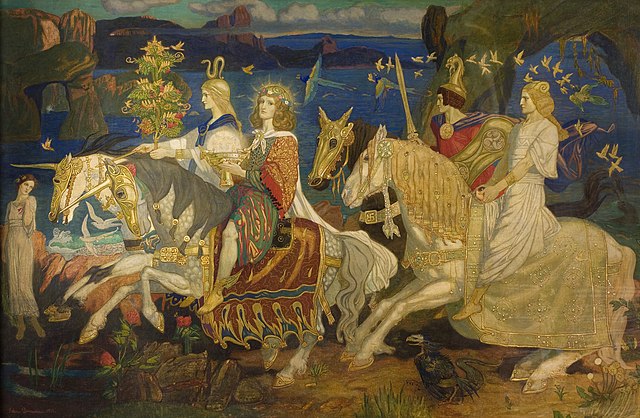
Irish Goddess Danu
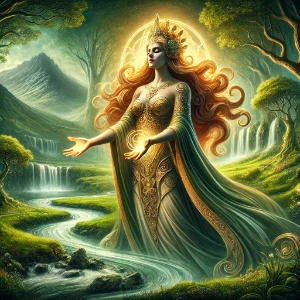
Domain: Mother Goddess, Fertility, Wisdom
Danu is often regarded as the mother of the Tuatha Dé Danann (the children of Danu), the main gods in Irish mythology. She represents the earth’s fertility and is associated with the nurturing aspects of nature. While not as prominently featured in surviving myths, Danu’s influence is foundational, symbolising growth, abundance, and the life-giving forces of the land.
Read more to learn about the Goddess Danu
Irish God The Dagda
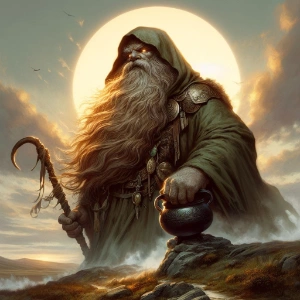
Domain: God of Plenty, Strength, Magic
Known as the “Good God” or “The Dagda,” he is one of the most influential figures in Irish mythology. The Dagda possesses immense strength and magical powers, wielding a massive club that can kill with one end and resurrect with the other. He is also associated with fertility and agriculture, often depicted with a cauldron, “Cauldron of Plenty”, that never runs empty, symbolising abundance.
The Dagda was also known to have a magic harp called Uaithne which could heal his followers, bless them before battle or make them forget about the aches and pains after. He was considered to be a unique musical Irish god blessed with many powers.
For more information, please read my article on the Dagda.
Irish Goddess Brigid (Brigit)
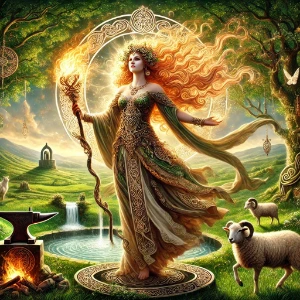
Domain: Goddess of Poetry, Healing, Smithcraft, and Fire
Brigid is an Irish goddess revered for her association with the arts, healing, and craftsmanship. She is considered the patroness of poets and smiths, inspiring creativity and skill. Brigid’s connection to fire symbolises destruction and purification, reflecting her role in transformation and renewal. She is celebrated annually on Imbolc, marking the beginning of spring.
Irish God Lugh (Lugh Lámhfhada)
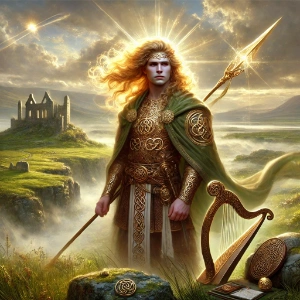
Domain: God of the Sun, Light, Crafts, and War
Lugh, often called Lugh Lámhfhada (“Lugh of the Long Arm”), is among the most skilled Irish Gods associated with numerous crafts and heroic endeavours. As a solar deity, he represents light, truth, and knowledge. Lugh is also a formidable warrior, playing a central role in the battles between the Tuatha Dé Danann and their adversaries. His festival, Lughnasadh, celebrates the harvest and the fruits of human labour.
For more information, please read my article on Lugh Lámhfhada.
Irish Goddess Morrígan (The Morrígan)
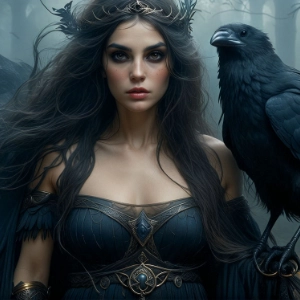
Domain: Goddess of War, Fate, and Sovereignty
The Morrígan is a complex and powerful goddess often depicted as a trio of sisters. She embodies the darker aspects of war and fate, foretelling death and influencing the outcomes of battles. Beyond her martial associations, the Morrígan also represents sovereignty and the land’s rightful ruler. Her shapeshifting abilities and ability to predict visions make her a formidable and mysterious figure.
For more information, please read my article on the Morrígan, Goddess of War, Fate and Sovereignty.
Irish God Dian Cecht
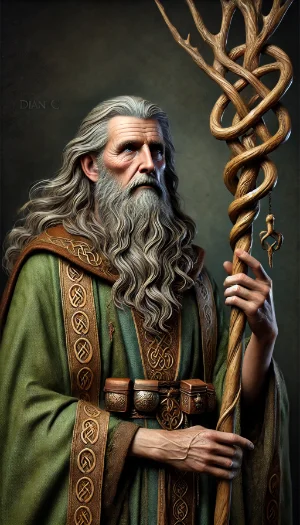
Domain: God of Healing and Medicine
Dian Cecht is renowned for his healing abilities and is considered the physician of the Tuatha Dé Danann. He wields a magical spear that can heal wounds and ailments, symbolising his role in restoring health and balance. Dian Cecht’s medical expertise makes him a vital deity in the mythological pantheon, emphasising the importance of healing and care in society.
Irish God Manannán mac Lir
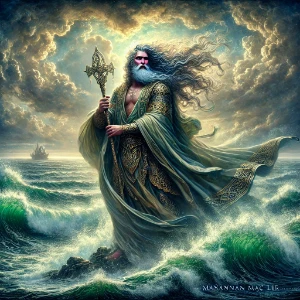
Domain: God of the Sea, Weather, and Magic
Manannán mac Lir is a prominent Irish sea god who rules over the oceans and controls weather patterns. He is often depicted with a magical cloak that grants him invisibility and a ship that sails without wind. As a guardian of the Otherworld, Manannán bridges the mortal realm and the mystical domains, guiding souls and heroes on their journeys.
For more information, please read my article on Manannán mac Lir.
Irish God Oghma
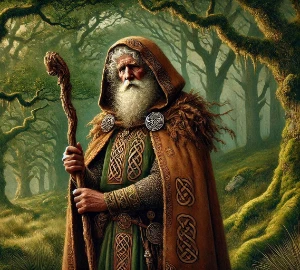
Domain: God of Eloquence, Learning, and Writing
Oghma is celebrated as the inventor of the Ogham alphabet, a script used in early Irish inscriptions. He embodies eloquence, learning, and the power of communication. As a patron of poets and scholars, Oghma fosters knowledge, education, and the preservation of culture through written and spoken word.
Irish God Bodb Dearg
Strengths: Leadership, Justice, Fate
Bodb Dearg, a prominent figure of the Tuatha Dé Danann in Irish mythology, was chosen as their king after their retreat to the mystical Otherworld. Known for his wisdom and fairness, he ruled from Sídh ar Femen in Munster, embodying themes of leadership, justice, and harmony. Central to tales like the Children of Lir, Bodb Dearg safeguarded the legacy of his people and symbolized the connection between Ireland’s sacred landscapes and its rich mythological heritage.
Irish Goddess Badb
Domain: Goddess of War and Sovereignty
Badb is another aspect of the Morrígan, often representing the battle frenzy and the chaos of war. She is known to shapeshift into a crow, a common symbol of death and battlefield turmoil. Badb’s presence in myths often signals impending conflict, and she plays a crucial role in determining the fate of warriors and the outcome of battles.
Irish God Aengus (Aengus Óg)
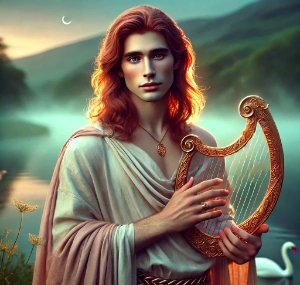
Domain: God of Love, Youth, and Poetry
Aengus Óg, meaning “Young Aengus,” is the Irish God of love, beauty, and poetic inspiration. He is often depicted as a youthful and charming deity who fosters romantic bonds and artistic expression. Aengus’s tales frequently involve themes of love and enchantment, highlighting the softer, more affectionate aspects of the divine.
Irish God Nuada
Domain: God of Kingship and War
Nuada is a key figure in the governance and martial aspects of the Tuatha Dé Danann. Known for his leadership and bravery, he serves as a king and a warrior, ensuring the protection and prosperity of his people. Nuada’s legacy includes the famous story of losing his hand in battle and receiving a silver prosthetic hand, symbolising resilience and restoring strength.
Irish Goddess Ériu
Domain: Goddess of the Land and Sovereignty
Ériu is one of the three goddesses after whom Ireland is named (Éire in Irish). She represents the very essence of the land, embodying its beauty, fertility, and sovereignty. Ériu’s presence in mythology underscores the deep connection between the people and their homeland, highlighting themes of identity and belonging.
Irish Mythology
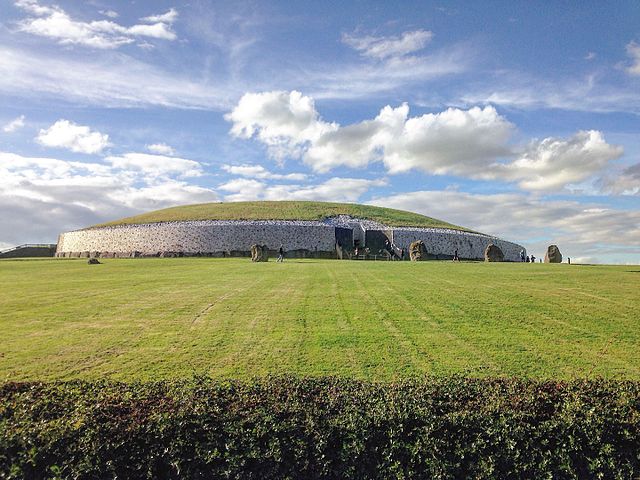
The ancient stories of Irish gods and goddesses offer a window into ancient Ireland’s values, beliefs, and natural world.
Each Irish God’s unique domains and stories contribute to a rich mythological landscape that continues to inspire and captivate.
These divine figures are essential to Ireland’s cultural heritage and storytelling traditions, whether symbolising the forces of nature, the arts, or ancient pagan beliefs.
These legends and stories need to be passed on through future generations so that we always keep this vital part of our Irish culture alive.
Please spread this information with family and friends and keep our Irish storytelling traditions alive for future generations.
Further Reading:
- Irish Myths and Legends: Gods and Fighting Men by Lady Augusta Gregory
- Irish Myths and Legends Vol 2: Cuchulain and the Red Branch of Ulster by Lady Augusta Gregory
- The Táin translated by Thomas Kinsella
- Celtic Mythology: Tales of Gods, Goddesses, and Heroes by Philip Freeman
Exploring these resources can provide deeper insights into the enchanting world of Irish mythology and its enduring legacy.
